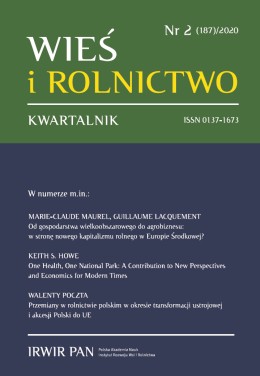Lending of Agricultural Land as an Alternative to Land Leasing
DOI:
https://doi.org/10.53098/wir022020/04Keywords:
dependent land use, lending of agricultural land, lease alternativeAbstract
The study addresses some problems of a relatively new phenomenon on the market of agricultural land, which is its free lending. It concerns the neighbourly turnover of land and, after leasing (contractual and grey), is the second form of its dependent use. In social-science theory there are various references to lending in the literature, and can be treated, among others, as a behavioural phenomenon, a kind of mutual altruism, or be located in the sphere of economics of sharing. Free lending of land that is part of a farm’s resources usually results from many complex and joint conditions. It is as sociated with various determinants of the region, including the location of the land and the demand for leasing. It is also a worse alternative for its owner in terms of maintaining its agricultural use. However, it also brings some benefits for both the owner, and therefore the lender, as well as the new user. The research was carried out in the form of a case study. The results indicate that the main reason for lending the land for free, was the lack of people willing to lease it. Other reasons were also: the desire to maintain the advantages of agricultural land use, its unregulated legal status but also the lack of profitability of its use by the owner, and therefore the lack of economic rents from the land. In the subregions of the Świętokrzyskie voivodeship studied, the share of land in lending in the structure of the dependent land use varied widely, ranging from 5% to 40% (only in one commune was there no lending of agricultural land for free), and the average was about 10–15%. Cautious estimates show that on a national scale it is about 180–320 thousand. ha, and therefore about 2% of all arable land in Poland.
References
Banaszek M. (2016). Ekonomia współdzielenia jako alternatywny kierunek rozwoju miast. Ekonomia Społeczna, 1, 51–59.
Czudec A., Miś T., Zając D. (2018). Zrównoważony rozwój obszarów wiejskich w wymiarze regionalnym. Poznań: Bogucki Wydawnictwo Naukowe.
Czyżewski B., Staniszewski J. (2015). Spadek znaczenia renty gruntowej w długim okresie i jego konsekwencja. Wieś i Rolnictwo, 169 (4), 33–46. DOI: https://doi.org/10.53098/wir.2015.4.169/02
Domagalska-Grędys M. (2012). Rozwój gospodarstw rolnych poprzez działania grupowe producentów. Zeszyty Naukowe Uniwersytetu Rolniczego im. Hugona Kołłątaja w Krakowie, 363, 51–53.
Kutkowska B. (red.) (2018). Rolnictwo wspierane społecznie – badania szans rozwoju małych gospodarstw rolnych na Dolnym Śląsku w aspekcie produkcji żywności wysokiej jakości. Wrocław: Ad Fontes.
Łomnicki A. (1997). Ekologiczne i behawioralne konsekwencje ewolucji. W: H. Krzanowska, A. Łomnicki (red.). Zarys mechanizmów ewolucji (s. 229–232). Warszawa: Wydawnictwo Naukowe PWN.
Marczak J., Niewińska J., Śnieć E. (1995). Dzierżawa nieruchomości rolnych. Zasady prywatyzacji własności rolnej Skarbu Państwa. Warszawa–Zielona Góra: Zachodnie Centrum Organizacji.
Mioduszewski J., Niedzielski E. (2012). Rola dzierżawy w zagospodarowaniu nieruchomości Skarbu Państwa. Olsztyn: PTE.
Musiał W. (2019). Zależne władanie ziemią – wybrane aspekty ekonomiczne. Kraków: Wydawnictwo Uniwersytetu Rolniczego w Krakowie.
Musiał W., Musiał K. (2016). Wybrane problemy przebudowy strukturalnej rolnictwa – przykład Małopolski. Roczniki Naukowe Stowarzyszenia Ekonomistów Rolnictwa i Agrobiznesu, 18 (6), 136–143.
Musiał W., Musiał K. (2012). Altruism in biology regarding disinterested forms of action in economy: Selected aspects. Acta Scientiarum Polonorum. Oeconomia, 11 (2), 45–55.
Rudawska I. (2016). Ekonomia dzielenia się, czyli konsumpcja współdzielona i inne formy alternatywnego dostępu do dóbr. Studia Ekonomiczne, Zeszyty Naukowe UE w Katowicach, 254, 181–189.
Sztokfisz B. (2017). Gospodarka współdzielenia – pojęcie, źródła, potencjał. Zeszyty Naukowe Uniwersytetu Ekonomicznego w Krakowie, 966 (6), 89–103. DOI: https://doi.org/10.15678/ZNUEK.2017.0966.0606
Weiner J. (1999). Życie i ewolucja biosfery. Warszawa: Wydawnictwo Naukowe PWN.
Wojewodzic T. (2017). Procesy dywestycji i dezagraryzacji w rolnictwie na obszarach o rozdrobnionej strukturze agrarnej. Zeszyty Naukowe Uniwersytetu Rolniczego im. H. Kołłątaja w Krakowie, 535, Seria Rozprawy, 412.











